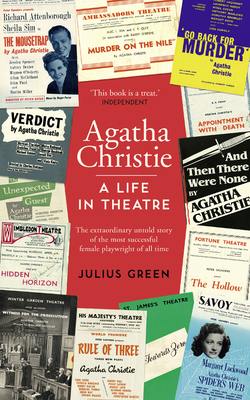Читать книгу Curtain Up: Agatha Christie: A Life in Theatre - Julius Green - Страница 16
SCENE FOUR Broadway Bound
ОглавлениеThe war, inevitably, brought disruption to Agatha’s life. Max secured a job at the Directorate of Allied and Foreign Liaison (part of the Intelligence branch of the RAF), working alongside his old friend, Egyptologist Stephen Glanville. The Mallowans lived at a number of London addresses in the early part of the war, including their house at Sheffield Terrace once it had been vacated by tenants, but in March 1941 Glanville introduced them to the stylishly modernist Lawn Road Flats (‘the Isokon Building’) in Belsize Park. Here they took up residence alongside a colourful group of emigres, artists and Soviet spies whose acquaintance doubtless broadened Christie’s creative, social and political frame of reference and helped to inform her characterisations and plots in what was to be another remarkably productive period of book writing.1 In 1942 Max volunteered to head the Cairo branch of the Directorate, where he could make use of his knowledge of Arabic, and he and Agatha were separated for the first time in ten years. In the autumn of 1943 Greenway was requisitioned by the Admiralty for use by the American navy, but Agatha was happily ensconced in Lawn Road Flats, where she dined regularly in the Isobar restaurant in the company of her intellectually stimulating new neighbours. By way of light relief, occasional weekends were spent in Haslemere at the home of Francis L. Sullivan and Danae Gaylen.
In November 1939, two months after the declaration of war, Collins published Christie’s masterful mystery Ten Little Niggers, which had been serialised in the Daily Express that summer. The deeply chilling conceit of the novel is that eight strangers are lured to the only house on an island, only to discover that their unknown and mysteriously absent host is methodically committed to executing each of his guests, as well as the two domestic staff hired for the occasion, in a manner inspired by a popular children’s nursery rhyme of the time. Each of the intended victims is exposed as having escaped retribution for previous misdemeanours, so that their deaths appear to represent some sort of vengeful justice. In a delicious detail, a framed copy of the rhyme hangs on the wall, and ten figurines representing the protagonists are also on display. As one by one they meet their fate by an unseen hand, a corresponding figurine is also mysteriously dispensed with. There is no means of escape from the island, and the terrifying conundrum throughout these events is that the killer must be one of the group; as the number of survivors diminishes so too, apparently, does the number of potential suspects.
Several of Christie’s books draw their titles from nursery rhymes, and I will not spoil the fun for Christie trivia buffs by providing a list. In this case the rhyme, which was at the time the subject of a garishly illustrated large-format children’s book, was drawn from Frank Green’s 1869 music hall song of the same title, which in its turn was based on an American song, ‘Ten Little Indians’, written by Septimus Winner the previous year.2 The word ‘nigger’, as generally used in the UK at this time, had yet to develop the deeply pejorative overtones with which it is now associated, and to most Britons would simply have described, albeit with the inherently patronising overtones of imperialism, the apparently exotic inhabitants of some far-flung corner of the Empire.
Christie’s masterpiece of suspense received excellent reviews and its highly theatrical premise made it an obvious candidate for dramatisation. Inevitably it wasn’t long before Edmund Cork started to receive requests from would-be adaptors, and in January 1940 he wrote to Agatha, ‘I think I told you last autumn that Reginald Simpson wanted to make a play of Ten Little Niggers and at that time I wasn’t quite sure he was the right dramatist to do it. I would rather like to know what your general feeling about dramatising this book is, as I am sure we will have to deal with the question before long as we have both an English and an American manager interested in the idea.’3
